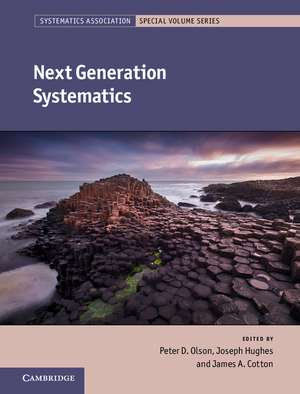Next Generation Systematics: Systematics Association Special Volume Series, cartea 85
Editat de Peter D. Olson, Joseph Hughes, James A. Cottonen Limba Engleză Hardback – 15 iun 2016
Preț: 481.82 lei
Preț vechi: 603.10 lei
-20% Nou
Puncte Express: 723
Preț estimativ în valută:
92.19€ • 96.26$ • 76.30£
92.19€ • 96.26$ • 76.30£
Carte indisponibilă temporar
Doresc să fiu notificat când acest titlu va fi disponibil:
Se trimite...
Preluare comenzi: 021 569.72.76
Specificații
ISBN-13: 9781107028586
ISBN-10: 1107028582
Pagini: 351
Ilustrații: 40 b/w illus. 8 colour illus. 5 tables
Dimensiuni: 194 x 253 x 20 mm
Greutate: 0.96 kg
Editura: Cambridge University Press
Colecția Cambridge University Press
Seria Systematics Association Special Volume Series
Locul publicării:New York, United States
ISBN-10: 1107028582
Pagini: 351
Ilustrații: 40 b/w illus. 8 colour illus. 5 tables
Dimensiuni: 194 x 253 x 20 mm
Greutate: 0.96 kg
Editura: Cambridge University Press
Colecția Cambridge University Press
Seria Systematics Association Special Volume Series
Locul publicării:New York, United States
Cuprins
List of contributors; Introduction: studying diversity in an age of ubiquitous genomics James A. Cotton and Peter D. Olson; Part I. Next Generation Phylogenetics: 1. Perspective: challenges in assembling the 'next generation' tree of life Michael J. Sanderson; 2. The role of next generation sequencing technologies in shaping the future of insect molecular systematics Joseph Hughes and Stuart Longhorn; 3. Phylogenetics of Nematoda Mark Blaxter, Georgios Koutsovoulos, Martin Jones, Sujai Kumar and Ben Elsworth; 4. High throughput multiplexed mitogenomics for metazoans-prospects and limitations Peter G. Foster, Maria Stalteri, Andrea Waeschenbach and D. Timothy J. Littlewood; 5. Investigating bacterial microevolution through next generation sequencing Josephine M. Bryant and Simon R. Harris; Part II. Next Generation Biodiversity Science: 6. Perspective: après le déluge: ubiquitous field barcoding should drive twenty-first-century taxonomy Richard M. Bateman; 7. Perspective: biodiversity and the (data) beast Holly M. Bik and W. Kelley Thomas; 8. Next generation biodiversity analysis Mehrdad Hajibabaei and Ian King; 9. Protist systematics, ecology and next generation sequencing David Bass and Thomas Bell; Part III. Next Generation Challenges and Questions: 10. Perspective: systematics in the age of genomics Antonis Rokas; 11. Perspective: the role of next generation sequencing for integrative approaches to evolutionary biology Ralf J. Sommer; 12. Next generation apomorphy: the ubiquity of taxonomically restricted genes Paul A. Nelson and Richard J. A. Buggs; 13. Utilizing next generation sequencing for evo-devo study of plant traits Rachael H. Walker, Paula J. Rudall and Beverley J. Glover; 14. An NGS approach to archaeobotanical museum specimens as genetic resources in systematics research Oliver Smith, Sarah A. Palmer, Rafal Gutaker and Robin G. Allaby; 15. From sequence reads to evolutionary inferences James A. Cotton; Index.
Recenzii
'… the book provides a very good overview of how the field of systematics is being shaped by the impact of a promising technology. In focusing on the major achievements and the challenges ahead it conveys a realistic vision for the future. One that has the potential to motivate many readers to embrace these approaches or to focus on solving the mentioned challenges.' Toni Gabaldón, The Quarterly Review of Biology
Descriere
Cheap and plentiful genome sequence data is transforming biology, and will surely transform systematics. This volume explores how.












